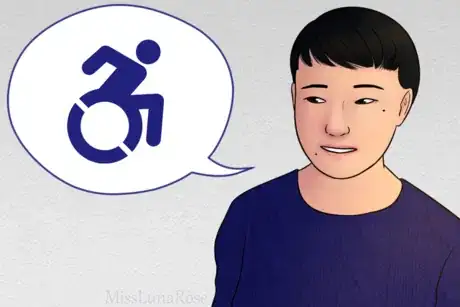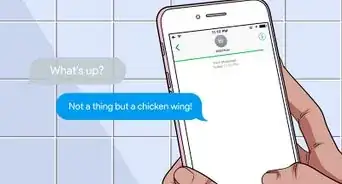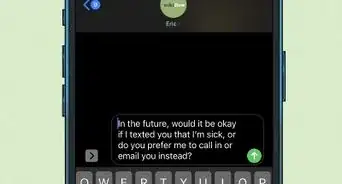X
This article was written by Luna Rose. Luna Rose is an autistic community member who specializes in writing and autism. She holds a degree in Informatics and has spoken at college events to improve understanding about disabilities. Luna Rose leads wikiHow's Autism Project.
This article has been viewed 39,213 times.
Disability can be a delicate subject, with some disabled people being very sensitive about it and others being very open. If you see someone who acts or looks different, you may have questions. Here is information on whether and how to ask politely.
Steps
-
1Consider whether the information is relevant. If it's not really relevant to you, then asking is probably rude. People with visible disabilities generally get asked the same questions a lot of times, and they may get tired of answering again and again. Mind your own business when it comes to disabled strangers or acquaintances.
- Avoid asking if you aren't having a conversation with them, or if it's not relevant to the conversation.
- Consider asking if they are already talking about disability, or if you're becoming friends and would like to ask gently.
-
2Ask about their needs if it looks like they might need help. Helping people with disabilities can be a very kind thing to do, as long as you're actually helping them (instead of hindering them). To avoid misunderstandings, ask before helping.
- For example, if someone is pushing a walker and headed towards a door, you could ask "Would you like me to get that for you?"
- Listen to them if they say they don't want help. They know what they are doing. For example, maybe a wheelchair user doesn't want you to take a chair away, because they want to get out of their wheelchair to sit in the chair.
Advertisement -
3Ask if you can talk about their disability, if you already have a relationship with them. If you have a growing friendship, romantic relationship, or other more-than-acquaintances relationship, it may be okay to ask. Say something like "May I ask about your visual disability?"
- Be sure to ask whether they want to talk about it, instead of jumping right in. Some people are okay with talking about their disabilities, and others aren't. (For example, maybe they were in a traumatic accident they prefer not to rehash.) This way, they can say "I don't like talking about it" and both of you can move on.
-
4Use a neutral tone when talking about disability. Nobody wants to feel like they are broken or defective. Using matter-of-fact language is the best way to handle it. Ask about the specific thing (like "May I ask about your ADHD?") or use the word "disability."
- Questions like "What's wrong with you?" can come off as insensitive.
- Questions like "May I ask what your disability is?" is much more polite and neutral in tone.
- Some people prefer to be called a "person with a disability." Others prefer to be called a "disabled person." Both of these are valid. It's best to use whatever language that person uses to describe themselves.
-
5Take their words seriously. Sometimes, disabled people get told that they are making up or exaggerating their disability, and people can respond in invalidating ways. Believe them, and show respect for their experiences. This goes a long way.
- Look at them and listen. Say things like "That sounds hard" or "I see." Ask for clarification if you need it.
- Avoid minimizing their disability by saying things like "everyone is like that sometimes." This person experiences this issue severely enough that it stops them from living their life in some way. If they say it's hard for them, assume it's hard.
- "You don't look _____" can be very annoying for a person with a disability to hear.
- Remember that things you might think you know may be wrong or irrelevant. Some stereotypes (like autistic people having no empathy) are wrong, and others (like wheelchair users being totally unable to walk) are only true of some people. If your information doesn't match their reality, then question the information, not their experiences.
-
6Ask about their specific needs. Disability can be complex, and the severity of some disabilities can vary from day to day. (For example, someone with chronic pain might be able to walk on good days but not on bad days.) There also may be complications you don't know about. You can ask if there are any needs it might be good for you to know about, so that you can help.
- You could say to a friend, "I don't know much about autism, but I've heard about stuff like sensory issues and meltdowns. I want us to be able to hang out in an environment that's comfortable to you, and I'd like to be able to help if you ever have a hard time. What would it be good for me to know?"
- You could say to a student, "I've been told you have dyslexia. I don't know much about the disability. Is there anything that it would be useful for me to know, so that I can accommodate you better in my classroom?"
- Some disabled people might have a hard time telling you what they need. Let them take as long as they need to think, and tell them they can send you an article, or tell you more as they think of it.
-
7Give a blanket offer of help. For many disabled people, there are good days and bad days, and it can be nice to know that someone has their back in case of a bad day.
- "Please feel free to let me know if there's anything you might need help with."
- "Don't be afraid to tell me if something is wrong. I'm always happy to help."
- "If you're ever having a bad sensory day, tell me and we can go somewhere quieter."
Advertisement
Warnings
- Don't push someone who doesn't seem interested in talking about their disability. If they aren't interacting with you, let them be. If they want to talk about something else, let the subject change.⧼thumbs_response⧽
- Stay away from negative sources like Autism Speaks, which may demonize disability and give misleading information.⧼thumbs_response⧽
Advertisement
About This Article
Advertisement















-Step-11.webp)


















































